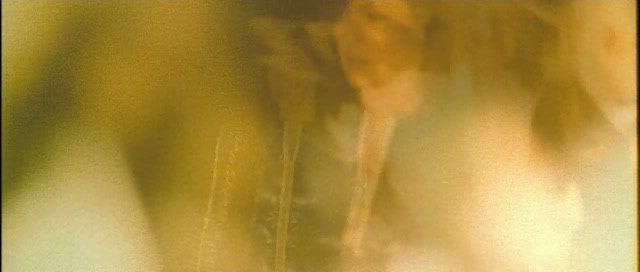

Olivier Assayas' Demonlover is a bleak, enthralling depiction of the soulless, corporatized world to come. It's a David Lynch nightmare for the Internet era, picking up on the paranoid, identity-warping vibe of Lost Highway and Mulholland Dr., and blending that atmosphere with a culture that's being digitized, stripped of its humanity, made sleek and robotic to mirror video games, porn, entertainment, and the horrible intersections between them. It's a harrowing and widely misunderstood film that only gradually reveals the truly dark soul lurking within its examination of a high-stakes international business deal.
Indeed, the film opens as a conventional, if dreamily paced, corporate espionage thriller, involving a prospective French/Japanese/American deal to distribute Japanese-made animated porn on the Internet. Diane (Connie Nielsen) is a corporate spy, a double agent pretending to work for Volf (Jean-Baptiste Malarte) while actually working for his competitor, planning to sabotage the deal in any way she can. Diane eliminates a corporate rival by drugging her and setting her up to get attacked, then rises up to take her place, so that she can personally oversee the deal and be in the best position to execute her plan when the time comes. Assayas parallels this ruthless corporate culture with images of Japanese porn in which sleek women with balloon-like breasts and no pubic hair — which couldn't be shown at all in Japan at one time — fight using "sex magic" and are defiled by penis-shaped eels. This is a film about the increasing inhumanity of our global culture: the Japanese animators demo a new 3D style in which the women somehow look even more plastic and fake than in the traditional animation, eerily human-looking but sanitized, stripped of personality, their eyes empty. Later, at a club, a group of actual human singers are similar glossy and robotic, moving as though driven by internal gears, smiling robotically as they perform.

The implication is that this worldwide culture is being subsumed by entertainment that removes the humanity from performance, business, and especially sex. Everything is fetishistic, remote from human experience, and often degrading, focused on mechanical repetition and a violent, misogynistic attitude towards women, who are treated as submissive vessels for unwilling penetration. There's something Pavlovian about it all, as though this digital, inhuman culture is teaching us how to act in the real world: Diane watches a porn in which a red, veined dildo mechanically thrusts in and out of a woman's mouth, and she reflexively wipes her own mouth with the back of the hand, as though salivating in response to these images.
The plot soon comes to involve the sadomasochistic, illegal website Hellfire Club, which depicts women — dressed up as icons of feminine power and strength — being defiled and tortured, while club members can type in requests for specific scenarios. The site shows women dressed as Wonder Woman, Lara Croft, Storm from the X-Men, and Emma Peel of British TV series The Avengers, all of them tied and chained to beds, electrocuted, tormented, staring accusingly up at the camera, and at the viewer. Assayas' Irma Vep dealt with the fetishization of the female action hero and the female form, but Demonlover takes it a step further, exploring the male desire to see these supposedly empowering embodiments of female power stripped and destroyed, to see them malleably twisted to whatever sick fantasy can be bought with a credit card and Internet access.
Gender is a big part of what Assayas is exploring here. Diane, for being efficient and businesslike at work, is routinely called a "cold bitch" by nearly everyone she meets — the only one who likes her is her American counterpart, Elaine (Gina Gershon), another ruthless businesswoman. Diane's coworker, Hervé (Charles Berling) wants her, turned on by precisely her chilly manner at work, her precision and ability to do her work without letting feelings get in the way. Of course, as the second half increasingly shows, this is only a facade for Diane, who is not nearly as soulless or as professional as she would like everyone to believe. She's a double agent, but it's as though her real secret is that she's still human in a world that's being repopulated by robots who only fake humanity, and often not very convincingly. Assayas pulls the rug out from under the viewer in the film's second half, after a pivotal sequence in which Diane is caught spying by Elaine, a scene that recalls Maggie Cheung's action hero roleplaying in Irma Vep. The two women get into a vicious fight that ends with them both bloody and passing out. The screen fades to black, and this proves to be a real Mulholland Dr. zoom-into-the-blue-box moment, because when Diane (yes, one wonders if that Lynchian name is significant) wakes up, everything seems to have shifted around her. The blood in the halls has been cleaned up, not that any of the hotel's guests, obliviously enjoying their vacations, seemed to notice the mess in the first place. Elaine has been cleaned up too, and she utterly disappears from the film, never to be mentioned or seen again, reflecting the total disposability and insignificance of any individual to the corporate mass media machine.

Everything shifts at work, too, as Diane slowly loses her power and everyone around her is revealed, one by one, as a double agent of one kind of another, including her former punching bag assistant Elise (Chloë Sevigny), who now takes control and has Diane reporting to her. The film becomes more and more destabilizing after this point, with the ground continually shifting below the feet of both Diane and the viewer. No one can be trusted, no one is loyal to anyone or anything, and everyone is only out for themselves. Diane thus transitions seamlessly from being a player within this system to being its docile, acquiescent victim, allowing herself to be led to her ruin. She was already sublimated to the system, complicit in its dehumanization, so she's very slow to resist when the system finally turns on her.
Assayas reflects his theme with the cool, glossy beauty of the cinematography, and with a soundtrack that vacillates between the dreamy lyricism of Sonic Youth's score and the grating, grinding noise of the industrial/metal selections that are dotted throughout the film. Every city looks the same, because they're primarily glimpsed as blurry lights from the back of a corporate car or from sleek, modern hotels and conference rooms. This plays into why these people are so unrooted, so disconnected from normal human relations. They don't even have countries or languages, really, and throughout the dialogue they're continually slipping between French, English and Japanese as though they forget what language they're speaking at any given moment.
The film is gorgeous and strangely haunting, playing out with the surreal logic and graceful imagery of a dream, which it increasingly becomes as Diane loses control. The apex of this theme of slipping control comes during a sex scene between Hervé and Diane that starts as a consensual seduction but abruptly turns into a rape, as though the scene had suddenly gone off track and become something totally different from what it started as. The next morning, Hervé wakes the sleeping Diane with tender caresses, very different from the brutal way he'd treated her before. These inconsistencies and disjunctions introduce ambiguity and uncertainty into the scene — encompassing even its startling, bloody resolution — to blur the line between sex as a romantic connection between individuals and sex as just another tool of control and domination.

Nearly the whole world is colonized in that way in Assayas' film, which offers precious little respite. There are momentary cracks in the strenuous inhumanity — Elise and Elaine going shoe-shopping and gossiping like stereotypical girls; Diane playing racquetball with a friend, disrupting her carefully maintained stoicism by actually getting sweaty — but such breaks are rare. Another is the very funny, strangely sexy shot of Elise in her downtime, lying naked in bed playing video games, intently driving her avatar to slaughter and happily kicking her legs in the air like a kid, contentedly playing. It's both a tossed-off non-sequitur and a key to the film, because in many ways Assayas is exploring a world where everything has been turned into one big video game, where the human cost of actions is not really considered any more than anyone thinks about hacking apart pixels to get to the end of a level.
That shot of Elise playing games is connected to the film's final scene, in which an unnamed suburban boy steals his dad's credit card to log onto the Hellfire Club, typing in a violent fantasy that he wants to see happen to a favorite female comic book character. He makes the request, but then barely pays attention as it is carried out on his computer monitor, doing his homework and paying no more attention to it than he would to any other ephemeral, disposable piece of entertainment. As he does his work, barely glancing at the screen, the woman whose torture he's paid for stares out at him, implicating him — and by extension, all consumers of the voyeuristic, exploitative modern culture — in her destruction.
This is a frightening film, a work of unsettling sci-fi that barely feels like sci-fi because the future world it depicts is maybe just a few steps ahead of our own. At times, it doesn't even seem exaggerated at all, as in the scene where Diane, Elaine and their peers meet to discuss a monopolistic deal that has been purposefully constructed to drive a competitor out of business. Assayas is suggesting that this ruthless corporate ethic is at the root of the dehumanizing culture on display in this film. And the participants treat it like a game, destroying one another to get to the top, where really they've only been set up as the next target for those below them. The film is an unforgettable satire of a globalist corporate culture that seems determined to turn people into video game characters or doll-like mannequins, just more grist for the pop culture machine.
I remember seeing this on its very limited theatrical release here in Australia one Sunday night. For some reason, when I left the cinema, I felt I'd seen the film at *exactly* the right time, as if seeing it on any other day or during any other hours would have been less effective somehow. I recall thinking it was a mess, but more interesting than quite a few "successful" films I'd seen (especially around that time).
ReplyDeleteI'm definitely partial to interesting messes, so that's probably why I loved this so much.
ReplyDeleteEd,
ReplyDelete"There's something Pavlovian about it all, as though this digital, inhuman culture is teaching us how to act in the real world...she reflexively wipes her own mouth with the back of the hand, as though salivating in response to these images."
A brilliant observation/point. It is as if we need to be taught because we have become so detached. I hadn't noticed the mouth-wiping.
I also hadn't thought of this :
"Gender is a big part of what Assayas is exploring here. Diane, for being efficient and businesslike at work, is routinely called a "cold bitch"..."
It's a film with much depth that, because it is so damn entertaining as a story, can make intelligent forays into this/our present/future without being weighed down.
It is indeed "frightening".
I wrote a review of it a while ago here: http://checkingonmysausages.blogspot.com/2011/02/demonlover-2002-olivier-assayas.html
Thanks Stephen. I remember seeing your review but hadn't seen the film at the time, so I only skimmed it then. I've re-read it now and you do a nice job grappling with what is, after all, a tremendously complex film that's just bursting with ideas. I especially like your phrase, "intellectual slumber," a nice summation of the modern condition that Assayas is chronicling and deconstructing here.
ReplyDeleteDemonlover would also make an excellent companion piece to something like Videodrome. Both are films about people having to 'recontextualise' themselves within the worlds in which they find themselves. Mulholland Drive is perhaps slightly different in that it is more about an ego-driven, self-created facade crumbling, while these other films are about people who seem cool, collected and in control seeing their worlds spiral out of control through the actions of nebulous outside forces. (Though Demonlover has parallels with Mulholland Drive in the critiquing of 'submissive' and 'dominant' versions of feminity, with Diane and Elaine being equated together in combat, while eventually Diane eventually gets dominated by the mousy assistant Elise)
ReplyDeleteWatching it again I’m struck by all the references to voyeurism (especially in those moments where we have seemingly unimportant cutaways to characters waiting for lifts and so on where we the audience are the only ones watching them. It plays into a CCTV'd world as well I suppose, where even the most uninteresting transitional moments of life are now captured on video monitors) and that throughout the film we the audience are also put in an uncomfortable position of watching others put on various ‘performances’ (from business meeting civility through to dress up S&M) but do not really care to understand their motivations or feelings, only what they can do for us.
Some scenes that I particularly liked were that the druggings in the final act as Diane is transported further on in (or to the next level of) the 'game' tie in nicely with the early chat between Karen and Elise after the first plane ride about taking Valerian pills to get through the long trip. Everyone’s drugging themselves just to get by even before it becomes part of a nefarious organisation’s entry procedure!
It would also seem to be a film paean to the glorious but cold hotel lobby. There are a number of extreme wide shots of characters walking through various high class hotels, transitioning from one space to another and leaving few physical traces behind them.
Perhaps my favourite sequence is the final one in Japan, when the Japanese assistant Kaori is shown showering in the bathtub after a night spent with Herve against the early morning Tokyo backdrop. Then she again walks out through the hotel lobby and off into the new day. It is both a sordid and strangely empowering moment, the most blatant acknowledgement between wining and dining important business clients and prostituting yourself in order to ensure the success of your negotiations.
Colin, yes, there's definitely a strong political and critical dimension to Demonlover that makes it very different from Mulholland Dr., and Videodrome would be a great companion piece as well. Love that idea.
ReplyDeleteThe voyeuristic media of this film only seems even more prescient and apt today than when it was made. It's as though the real world is trying to catch up to the one depicted here, moving ever closer to it, a scary thought indeed.